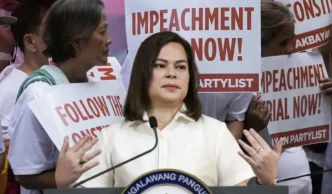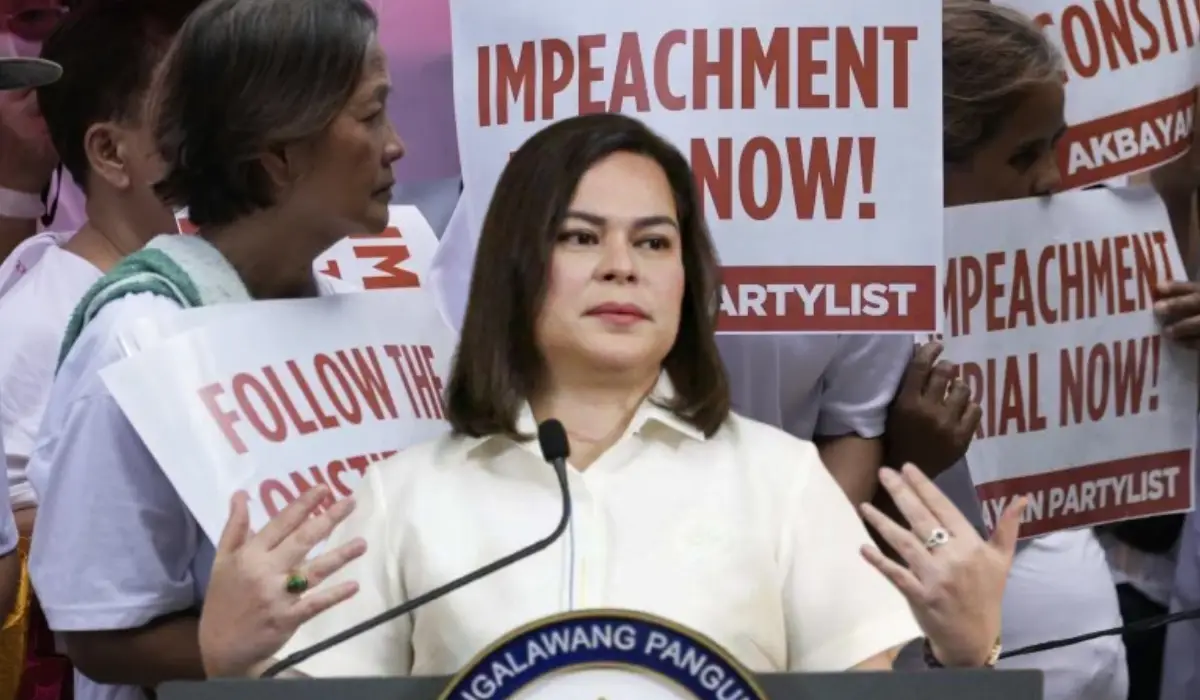A growing chorus of constitutional experts and legal scholars in the Philippines is pressing the Senate to move forward with the impeachment trial of Vice President Sara Duterte, citing the need for clarity and accountability in the nation’s political landscape. The call comes as allegations of misconduct and questions over the vice president’s role in governance intensify, raising broader concerns about the country’s democratic institutions and the balance of power within its government.
Allegations and the Push for Accountability
The impeachment proceedings against Vice President Sara Duterte, daughter of former President Rodrigo Duterte, stem from a series of allegations that have stirred public and political debate. Critics have accused her of mismanagement in her capacity as Education Secretary—a position she held concurrently until recently—and of using public funds improperly. While no definitive evidence has been presented to substantiate these claims, the mounting pressure from opposition lawmakers and civil society groups has led to formal impeachment complaints being filed in the House of Representatives.
Constitutional experts argue that the Senate, as the body responsible for trying impeachment cases, must act swiftly to address the allegations, regardless of their ultimate merit. “The process itself is a cornerstone of democratic accountability” said Professor Maria Elena Cruz, a leading constitutional scholar at the University of the Philippines. “Delaying or dismissing the trial without due process risks undermining public trust in our institutions.”
The House of Representatives transmitted the impeachment articles to the Senate earlier this month, marking a critical juncture in the process. Under the Philippine Constitution, the Senate serves as the impeachment court, with senators acting as jurors. A two-thirds majority is required to convict and remove an official from office. However, political analysts note that the Senate’s current composition, which includes several allies of the Duterte family, may complicate the proceedings.
Political Dynamics and the Duterte Legacy
The impeachment case is unfolding against the backdrop of a complex political landscape in the Philippines, where the Duterte name carries significant weight. Rodrigo Duterte’s presidency from 2016 to 2022 was marked by a controversial war on drugs, populist rhetoric, and a strong grip on political loyalty among certain segments of the population. Sara Duterte, who ran on a unity ticket with President Ferdinand Marcos Jr. in the 2022 elections, was seen by many as a bridge between the Duterte and Marcos political dynasties. However, tensions between the two camps have since emerged, with some analysts suggesting that the impeachment push may be driven by underlying power struggles.
“This is not just about Sara Duterte’s alleged misconduct; it’s about who controls the narrative ahead of the 2028 elections” said political commentator Juan Reyes. “The Marcos administration may see this as an opportunity to weaken the Duterte bloc, while the Dutertes are framing it as a politically motivated attack.”
Public sentiment, as reflected in recent discussions on social media platforms like X, appears divided. Supporters of the vice president argue that she is being unfairly targeted, with some users pointing to her efforts to reform the education sector as evidence of her commitment to public service. Critics, however, highlight what they describe as a pattern of opacity in her leadership, calling for a thorough investigation.
Constitutional Implications and Senate Hesitation
Beyond the immediate political stakes, the impeachment case raises significant constitutional questions about the scope of accountability for high-ranking officials. Legal scholars have pointed to ambiguities in the 1987 Constitution regarding the grounds for impeachment, which include “culpable violation of the Constitution, treason, bribery, graft and corruption, other high crimes, or betrayal of public trust.” The lack of precise definitions for terms like “betrayal of public trust” has led to debates over whether the allegations against Duterte meet the threshold for impeachment.
Some senators have expressed reluctance to proceed with the trial, citing the potential for further political polarization. Senate President Juan Miguel Zubiri, a known ally of the administration, has emphasized the need for a “fair and impartial process” but has stopped short of committing to a timeline for the trial. “We must ensure that justice is served without turning this into a circus” he said during a recent press conference.
Constitutional experts, however, warn that inaction could set a dangerous precedent. “If the Senate fails to act, it risks sending a message that certain officials are above the law” said Attorney Rafael Gomez, a former commissioner of the Commission on Elections. “This could erode the checks and balances that are fundamental to our democracy.”
Broader Context of Democratic Reforms
The impeachment debate comes at a time when the Philippines is grappling with broader questions about its democratic framework. Recent discussions in Congress about amending the 1987 Constitution—often referred to as “Charter Change” or Cha-Cha—have reignited debates over term limits, federalism, and the balance of power between the executive and legislative branches. Critics of the current administration fear that constitutional reforms could be used to consolidate power, while proponents argue that updates are necessary to address systemic inefficiencies.
For many observers, the handling of the Duterte impeachment trial will serve as a litmus test for the state of Philippine democracy. “This is an unfinished revolution” said Ana Morales, a columnist for a leading national daily. “The institutions we fought for after the Marcos dictatorship are still being tested, and how we resolve this crisis will shape the future of governance in our country.”
The reference to an “unfinished revolution” harks back to the 1986 People Power Revolution, which ousted Ferdinand Marcos Sr. and ushered in a new democratic era. Yet, decades later, issues of political dynasties, corruption, and institutional trust continue to challenge the nation’s democratic aspirations. The interplay between the Duterte impeachment and the push for constitutional reform underscores the fragility of these gains, as well as the enduring influence of historical legacies on contemporary politics.
Public Reaction and Economic Concerns
As the Senate deliberates on the impeachment trial, public reaction remains a critical factor. Protests both for and against Vice President Duterte have been organized in Manila and other major cities, though they have so far remained peaceful. Civil society groups, including student organizations and human rights advocates, have called for transparency in the proceedings, while Duterte’s supporters have rallied under the banner of defending her father’s legacy.
Economically, the political uncertainty surrounding the impeachment has raised concerns among business leaders and investors. The Philippine Stock Exchange has shown signs of volatility in recent weeks, with analysts attributing some of the fluctuations to fears of prolonged instability. “Political crises often deter foreign investment, and we’re already seeing hesitation in key sectors like infrastructure and manufacturing” said economist Carla Villanueva. “The government needs to resolve this quickly to maintain confidence.”
Additionally, the cost of ongoing political disputes is a burden on public resources. Legal proceedings, security measures for protests, and the potential for disrupted governance all carry financial implications. For instance, the budget allocated for the Senate’s operations during an impeachment trial could divert funds from other pressing needs, such as education or disaster response—a point of contention given the Philippines’ vulnerability to natural calamities.
Looking Ahead: A Test for Philippine Democracy
As the Philippine Senate weighs its next steps, the impeachment trial of Vice President Sara Duterte stands as a pivotal moment for the country’s democratic institutions. The outcome—whether it results in conviction, acquittal, or a stalled process—will likely reverberate beyond the immediate political sphere, influencing public trust, economic stability, and the broader discourse on constitutional reform.
For now, the nation watches as senators grapple with their dual roles as politicians and jurors. Will the trial reinforce the principles of accountability and transparency, or will it deepen divisions within an already polarized society? These questions loom large, with answers that may shape the trajectory of Philippine governance for years to come.
















